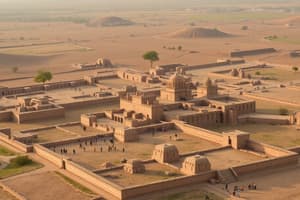Podcast
Questions and Answers
What feature of Harappan Architecture indicates a high standard of living?
What feature of Harappan Architecture indicates a high standard of living?
- Kiln-fired bricks and mud-brick foundations
- Private wells, bathrooms, and drainage systems (correct)
- Public baths
- Sophisticated urban planning
What is the significance of the Great Bath in Mohenjo-Daro?
What is the significance of the Great Bath in Mohenjo-Daro?
- It was a marketplace for merchants
- It was a public bath for all citizens
- It was a temple for worshiping gods
- It was a large pool surrounded by changing rooms and steps (correct)
What is the direction of the Indus Script?
What is the direction of the Indus Script?
- From right to left (correct)
- From top to bottom
- From left to right
- From bottom to top
What is the likely division of the Indus Valley Civilization society?
What is the likely division of the Indus Valley Civilization society?
What is the primary material used in Harappan Architecture?
What is the primary material used in Harappan Architecture?
What is the significance of the citadel in Harappan cities?
What is the significance of the citadel in Harappan cities?
Flashcards are hidden until you start studying
Study Notes
Harappan Architecture
- Characterized by well-planned cities with advanced drainage systems and public baths
- Buildings made of baked bricks, with some structures featuring advanced techniques like kiln-fired bricks and mud-brick foundations
- Houses had private wells, bathrooms, and drainage systems, indicating a high standard of living
- Cities were divided into a citadel (upper city) and a lower city, with the citadel containing public buildings and granaries
Mohenjo-Daro
- One of the largest and most well-preserved Indus Valley Civilization cities
- Located in modern-day Pakistan, near the Indus River
- Excavations have revealed a sophisticated urban planning system, with a complex drainage system and a large central marketplace
- The city's Great Bath is one of the most impressive architectural features, with a large pool surrounded by changing rooms and steps
Indus Script
- Undeciphered writing system used by the Indus Valley Civilization
- Consists of over 400 symbols, including logograms, phonetic symbols, and determinatives
- Found on seals, pottery, and other artifacts, but the meaning and language remain unknown
- The script is written from right to left, and may have been used for both secular and religious purposes
Social Hierarchy
- Society was likely divided into three main classes:
- Rulers and priests
- Merchants and artisans
- Laborers and farmers
- Women may have played a significant role in the society, with some evidence suggesting they held positions of power
- The lack of grand palaces and temples suggests a relatively egalitarian society, with power distributed among multiple groups
Economy And Trade
- The Indus Valley Civilization was a major center of trade, with trade networks extending to Mesopotamia, Egypt, and other regions
- The economy was based on agriculture, with crops like wheat, barley, and cotton being major exports
- The civilization was also known for its advanced metallurgy, with copper, bronze, and gold being used in jewelry and other items
- The presence of seals and weights suggests a standardized system of weights and measures, facilitating trade and commerce
Harappan Architecture
- Well-planned cities with advanced drainage systems and public baths
- Buildings made of baked bricks, with some structures featuring kiln-fired bricks and mud-brick foundations
- Houses had private wells, bathrooms, and drainage systems, indicating a high standard of living
- Cities were divided into a citadel (upper city) and a lower city, with the citadel containing public buildings and granaries
Mohenjo-Daro
- One of the largest and most well-preserved Indus Valley Civilization cities
- Located in modern-day Pakistan, near the Indus River
- Excavations have revealed a sophisticated urban planning system, with a complex drainage system and a large central marketplace
- The city's Great Bath is a notable architectural feature, with a large pool surrounded by changing rooms and steps
Indus Script
- Undeciphered writing system used by the Indus Valley Civilization
- Consists of over 400 symbols, including logograms, phonetic symbols, and determinatives
- Found on seals, pottery, and other artifacts, but the meaning and language remain unknown
- Written from right to left, and may have been used for both secular and religious purposes
Social Hierarchy
- Society was likely divided into three main classes: rulers and priests, merchants and artisans, and laborers and farmers
- Women may have played a significant role in the society, with some evidence suggesting they held positions of power
- The lack of grand palaces and temples suggests a relatively egalitarian society, with power distributed among multiple groups
Economy and Trade
- The Indus Valley Civilization was a major center of trade, with trade networks extending to Mesopotamia, Egypt, and other regions
- Economy was based on agriculture, with crops like wheat, barley, and cotton being major exports
- Civilization was known for its advanced metallurgy, with copper, bronze, and gold being used in jewelry and other items
- Presence of seals and weights suggests a standardized system of weights and measures, facilitating trade and commerce
Studying That Suits You
Use AI to generate personalized quizzes and flashcards to suit your learning preferences.



